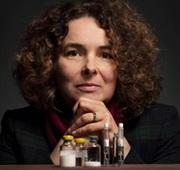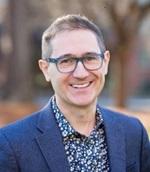Alina Alexeenko, Ph.D.

Professor of Chemical Engineering and Aeronautical and Astronautical Engineering
Purdue University
Talk Title: “Automation and Digitalization for Lyophilization: Trends and Opportunities Identified by the LyoHUB Technology Roadmapping”
Bio: Alina Alexeenko is a professor at the School of Aeronautics and Astronautics and Davidson School of Chemical Engineering. She also currently serves as senior associate dean at the College of Engineering at Purdue. Alexeenko is a founding Co-Director of Advanced Lyophilization Technology Hub – LyoHUB established in 2014 focused on advancing the science and technology of pharmaceutical lyophilization for manufacture biopharmaceuticals and vaccines.
She received her PhD in Aerospace Engineering from the Pennsylvania State University in 2003 and was a WiSE post-doctoral fellow at University of Southern California from 2004 to 2006. Dr. Alexeenko is an associate fellow of American Institute of Aeronautics and Astronautics (AIAA) and served as chair of AIAA Thermophysics Technical Committee for 2016-2018. Alexeenko’s research is in rarefied gas dynamics, heat and mass transfer process modeling in application to high-altitude aerothermodynamics and spacecraft technologies and pharmaceutical manufacturing. She has authored over 200 journal and conference papers and is a co-inventor on 10 patents. Dr. Alexeenko has been collaborating broadly with industry firms on design and improvement of pharmaceutical lyophilization equipment and processes since 2008 and co-led the development of LyoHUB’s Lyophilization Technology Roadmap to 2025 and Beyond and the first recognized consensus technical standard for pharmaceutical lyophilization issued by ASTM in 2022.
Gaurav Chopra, Ph.D.

Associate Professor of Chemistry and Computer Science
Purdue University
Talk Title: “Artificially Intelligent Agents for Accelerating Drug Discovery and Development”
Bio: Gaurav Chopra is a tenured Associate Professor in the Departments of Chemistry and Computer Science at Purdue University and AnalytiXIN Fellow in Life Sciences and Manufacturing. As the Director of the Merck-Purdue Center, an initiative supported by Merck, Chopra oversees projects spanning Purdue University. Chopra’s laboratory works in the area of Molecular Artificial Intelligence and develops AI platforms/copilots for closed-loop laboratory automation, digital healthcare and conducting experimental validations in cancer- and neuro-immunology for drug discovery and development. Chopra received his undergraduate degree in Mechanical Engineering from the Indian Institute of Technology (IIT), Delhi, India and his M.S. in in Mechanical Engineering from the University of California, Irvine. Chopra received his PhD in Computational Mathematics with Professor Michael Levitt (2013 Nobel Laureate in Chemistry) at Stanford University - School of Engineering and was a JDRF Fellow developing immune tolerance therapies with Professor Jeffrey Bluestone at the University of California – San Francisco, School of Medicine. Chopra’s research program is funded by several federal agencies and companies, such as National Institutes of Health, Department of Defense, Defense Threat Reduction Agency, National Science Foundation, to name a few. He has given over 100 invited lectures nationally and internationally to universities, companies and FDA related to AI-based automation, immunology and drug discovery. Recently, Chopra led a team that won the ASPIRE Grand Prize by the National Center for Advancing Translational Science (NCATS) for developing AI-guided drug discovery and automation platform. His current work with NCATS includes developing large language model (LLM)-based AI infrastructure to plan, execute, analyze and automate chemical and biological experiments to accelerate drug discovery and development. Outside of academia, Chopra has co-founded two companies – Meditati Inc. and BrainGnosis Inc. Chopra is dedicated to fostering diversity in academia, developed a virtual reality-based drug discovery game, MINT, and organized outreach events for K-12 and university students, promoting a love for science and inclusivity in scientific endeavors.
Sean Ekins, Ph.D., DSc.

CEO &Founder
Collaborations Pharmaceuticals, Inc.
Talk Title: “Applying Artificial Intelligence in a Small Drug Discovery Company”
Abstract: Collaborations Pharmaceuticals, Inc. is a privately owned company funded by NIH and DOD grants that performs research and development on innovative therapeutics for multiple rare and neglected infectious diseases. We also develop and apply our artificial intelligence (AI) software to aid in drug discovery and toxicology assessment. Our MegaTox software can also be used by consumer product companies and those interested in sustainable chemistry.When I started the company we were initially focused on using machine learning (ML) approaches to focus and prioritize the use of expensive assays very early in the drug discovery process. We have used ML for generating ADME/Tox models as well as models for targets or phenotypic assays. These methods have allowed us to leverage public data to select additional compounds for testing, or build models after generating our own data. Such models have been applied for rare and neglected disease drug discovery. Over the past few years we have expanded to develop generative AI approach called MegaSyn for the de novo design of molecules which leverage our ML models for various targets and off-targets. We are currently applying these to several projects including the development of new psychoplastogens with various therapeutics applications. Some target endpoints, however, have little data available, and the training of a typical ligand-based ML models is challenging. Large multi-task networks have been trained using transfer-learning, in which a related task is trained alongside the primary task(s), with the model then gaining predictive performance on the primary task. We have used this approach with the thousands of datasets available in databases like ChEMBL. We have also explored three large multi-task model architectures (a graph-based approach graphSAGE, a previously published deep learning model comprised of convolutional layers and long short term memory (LSTM) layers (Conv-LSTM), and a transformer model pre-trained on predicting accurate SMILES structures (MolBART) to take advantage of pre-training). Our applications of ML and AI to drug discovery projects will be described to highlight how these technologies can be utilized to address some of the challenges we face in developing treatments for the many diseases that are still without a treatment. Some of the potential misuses of the technologies will be described.
Bio: Sean is founder and CEO of Collaborations Pharmaceuticals, Inc. which is focused on developing and using machine learning and AI approaches for rare and neglected disease drug discovery. Sean graduated from the University of Aberdeen; receiving his M.Sc., Ph.D. in Clinical Pharmacology and D.Sc. in Science. He was a postdoc at Eli Lilly then senior scientist at Pfizer, then served at increasing levels of responsibility in several start-up pharma and software companies (Concurrent, GeneGo, CDD and Phoenix Nest) as well as scientific advisor for several rare disease foundations (PHRF, HNF). He has authored or co-authored >360 peer reviewed papers, book chapters, edited 5 books on different aspects of drug discovery research as well as authored a new book on ‘Winning Grants’. His interests include the dual use of AI and coverage of his research has also appeared in the Economist, Financial Times, Washington Post and appears in a Netflix documentary “Unknown: Killer Robots”.
Michael T. Hughes, Ph.D.
Director of Digital Engineering
Cummins, Inc.
Talk Title: "Digital Transformation and Cummins Products"
Abstract: As digital technologies are maturing Cummins has been applying them to areas of the business where strong synergies exist. This presentation will cover applications of AI/Vehicle Health Monitoring and Computer Vision technologies that are improving our products. It will conclude with lessons learned that we have experienced during this journey.
Bio: Mike works in Cummins corporate and research technology (R&T) division leading numerous areas across the digital spectrum. R&T supports a variety of business unit product development activities. Mike has had a variety of roles in engineering and IT with his last 5 years being focused on accelerating digital product engineering. His team develops and facilitates commercialization of new digital architectures and product features. The technologies in his domain include connected/software defined vehicles, AI technologies, augmented reality, virtual reality, and remote assist capabilities. Mike is also an industrial advisor and member of Purdue’s Digital Enterprise Center.
Douglas Kiehl

Senior Director, DCTO, Digital Twin Center of Excellence
Eli Lilly & Company
Talk Title: "Exploring the Digital Event Horizon: Enabling Digital Transformation in Pharma through Cross-Collaborative Partnerships"
Abstract: Digital transformation as a theme is driving and defining the disruptive and transformative roadmap for more expedient operations, product development, advanced manufacturing, supply chain and lifecycle management across multiple disciplines and industries. For the pharmaceutical industry, establishment of a digital transformation framework is increasingly aligned with principles consistent with the extrapolation of Industry 4.0 to pharmaceutical manufacturing and operations, with the objective of optimizing production and augmenting current workforce with automation and digital manufacturing operations. This presentation will discuss the FDA/FRAME initiative, digital twins and cross-collaborative partnerships as primary enablers for advanced manufacturing and digital transformation in pharma.
Bio: Doug Kiehl is a Senior Director at Eli Lilly and Company and leads the Disruptive/Transformative Technologies Team (DT3) and Digital Twin Center of Excellence with focus on digital transformation, automation, extractables/leachables and next-gen bioprocess. He serves as a member of the United States Pharmacopeia (USP) Packaging and Distribution Expert Committee, Chair for the Product Quality Research Institute (PQRI) Development Technical Committee, PhRMA Topic Lead for the International Council for Harmonisation (ICH) Q3E Guidance Expert Working Group, Board of Directors for the Extractables/Leachables Safety Information Exchange (ELSIE) Consortium, Chair for the International Society for Optics and Photonics (SPIE) Defense and Commercial Sensing Conference, Executive Governing Council for the Nano-Bio Materials Consortium (NBMC/SEMI) and founding member of the Biomolecule Reactivity Consortium. He has published his work in several peer-reviewed and trade journals, and has organized, chaired and presented at numerous conferences.
Manuel Sanchez-Felix, Ph.D.

VP Drug Delivery Search & Evaluation
Halozyme Therapeutics
Talk Title: "Industry 4.0 Revolution Meets Pharmaceutical Transformation: Novel Solutions for Pressing Patient Needs"
Abstract: The industrial landscape is undergoing a profound shift - Industry 4.0, fueled by revolutionary business models, AI-powered manufacturing, data-driven insights, and human-centered organization. Companies like Tesla exemplify this transformation, seamlessly interweaving transportation, energy, and communication to redefine industry boundaries. The presentation will start by highlighting these changes and how they are being accomplished.However, the pharmaceutical and biotech sectors face distinct challenges: disrupted supply chains, low adherence rates, lagging health outcomes, escalating patient demands, and rising costs. Recognizing the striking similarities between these industry-wide changes and pharmaceutical challenges, this talk will delve into how the industry is embarking on its own transformation journey to meet patient needs.Specific examples will be presented on how the industry and a small company like Halozyme is enabling this transformation. Some exciting new ideas will be shared arising from a recent NIPTE (co-lead by members from the Department of Industrial and Molecular Pharmaceutics) Patherfinder Workshop on “Advanced Manufacturing Technologies”.
Bio: Dr. Manuel Sanchez-Felix is the VP of the Drug Delivery Search & Evaluation Group at Halozyme. He is a scientific leader with over 20 years of experience in drug discovery and development where he co-invented products and contributed to the successful development and launch of various patient centric pharmaceutical products. Previously he was at Novartis where he led a cross-functional group from Discovery and Development that have evaluated and implemented external Novel Delivery Technologies for many different types of modalities. He is also part of initiatives designed to promote innovation within Novartis. His previous position at Novartis involved heading a group of scientists at the interface between Research and Development, establishing physicochemical and biopharmaceutical properties, and combining this information to initiate development strategy and formulation design. Prior to joining Novartis, Manuel was at Eli Lilly & Company for 20 years. His area of expertise includes Biopharmaceutics, drug delivery and patient-centered formulation design. Areas of drug discovery where he has developed products include CNS, infectious diseases (specifically TB), oncology, regenerative, cardiovascular and metabolic diseases. Dr. Sanchez-Felix received his B.Sc. Honors degree and Ph.D in Chemistry from the University of Surrey, UK. He is also an Adjunct Professor in the Department of Industrial and Physical Pharmacy at Purdue University (West Lafayette, IN) and a Fellow of the Royal Society of Chemistry. Recently, he has joined the Advisory Board for the Biomedical Program at Middlesex Community College.

